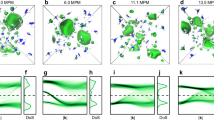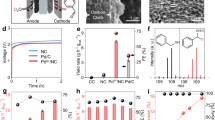Abstract
BENZENOID compounds have been reduced to dihydro-derivatives by means of sodium and alcohol in liquid ammonia1. The process has now been carried out electrolytically on m-tolyl methyl ether at a smooth copper cathode with a current density of 0.04 amp./sq. cm. in a saturated solution of sodium ethoxide in liquid ammonia containing 5 percent of ethyl alcohol, the temperature being maintained at about 40° by means of a solid carbon dioxide–alcohol bath. The dihydro-m-tolyl methyl ether, probably the 2 : 5-, was identified (see ref. 1) by conversion to the 2 : 4-dinitrophenyl-hydrazone of 3-methyl-Î"2-cyclohexenone, m.p. 174°, undepressed by an authentic specimen. The current efficiency of the reduction was low, but can probably be improved, and the process may be of general utility for similar reactions.
This is a preview of subscription content, access via your institution
Access options
Subscribe to this journal
Receive 51 print issues and online access
$199.00 per year
only $3.90 per issue
Buy this article
- Purchase on SpringerLink
- Instant access to full article PDF
Prices may be subject to local taxes which are calculated during checkout
Similar content being viewed by others
References
Birch, J. Chem Soc., 430 (1944).
Author information
Authors and Affiliations
Rights and permissions
About this article
Cite this article
BIRCH, A. Electrolytic Reduction in Liquid Ammonia. Nature 158, 60 (1946). https://doi.org/10.1038/158060b0
Issue date:
DOI: https://doi.org/10.1038/158060b0



